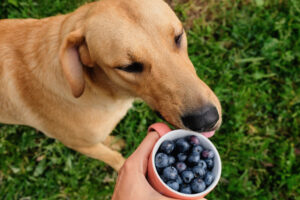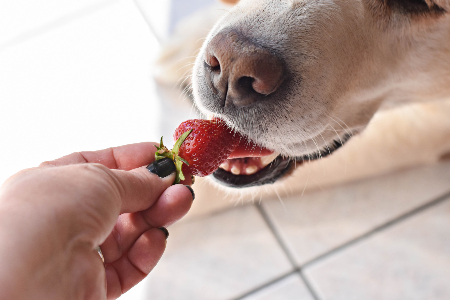Dogs are often considered man’s best friend and are beloved companions in many households. As such, it’s natural for dog owners to want to share their favorite foods with their furry friends. One food that often comes up in this context is berries. But can dogs have berries? This article will explore the different types of berries that are safe for dogs and those that should avoid.
Dogs can have some types of berries. However, it is crucial to be cautious and carefully choose the types of berries that you give to your dog, as some types of berries can be toxic to dogs.
Some berries that are generally safe for dogs to eat include strawberries, raspberries, and blueberries. These berries are a good source of antioxidants and can be a healthy treat for your dog in moderation.
Other berries, such as cherries, grapes, and raisins, can be toxic to dogs and should be avoided. These berries can cause kidney failure in dogs, even in small amounts.
Can Dogs Have Berries

Many types of berries are safe for dogs to eat in small amounts. Some examples of berries that are generally considered safe for dogs to eat include:
- Blueberries
- Strawberries
- Raspberries
- Blackberries
Berries can be a good source of vitamins and antioxidants for dogs, but it is essential to remember that they should only be given in moderation, as they are high in natural sugars. It is also vital to ensure that the berries are fresh and have not been sprayed with chemicals or pesticides.
Some types of berries are toxic to dogs and should be avoided. These include:
- Raisins
- Currants
- Grapes
If you are unsure whether a particular type of berry is safe for your dog to eat, it is a good idea to consult with a veterinarian or a professional dog trainer for guidance. They can provide information on which berries are safe for dogs to eat and how much is appropriate to give.
Can dogs safely eat berries?
Some berries are safe for dogs, while others can be toxic. Here is a list of some common berries and whether they are safe or harmful for dogs:
Safe berries
Blueberries
Raspberries
Strawberries
Toxic berries includes:
Nightshade berries (e.g., tomatoes, eggplants)
Elderberries (except for fully ripened berries that are cooked)
Holly berries
Mistletoe berries
Note that even if a berry is generally safe for dogs, individual dogs may still have allergies or sensitivities to certain berries. If you are unsure whether a particular type of berry is safe for your dog to eat, it is always best to consult a veterinarian.
It is also important to remember that while some berries may be safe for dogs to eat, they should still be given in moderation as part of a balanced diet. Too much of any one type of food, including berries, can lead to digestive issues or other health problems.
What are the potential benefits of giving berries to a dog?

Berries can be a healthy and tasty dog treat and may offer potential health benefits. Some potential benefits of giving berries to a dog include:
Providing antioxidants
Many types of berries are rich in antioxidants, which can help protect cells from damage caused by free radicals. Antioxidants help support overall health and wellness in dogs.
Supporting immune function
Some berries, such as blueberries and strawberries, contain compounds that may help support the immune system and protect against certain types of infections and diseases.
Improving cardiovascular health
Some berries, such as blueberries, are rich in compounds that may help improve heart health and reduce the risk of certain cardiovascular diseases.
Promoting healthy skin and coat
Berries are a good source of vitamins and minerals for healthy skin and a shiny coat.
It is important to remember that berries should only be given to dogs in moderation, as they are high in natural sugars. It is also essential to ensure that the berries are fresh and have not been sprayed with chemicals or pesticides.
Are there any potential side effects of feeding berries to a dog?
Most berries are safe for dogs to eat in moderation and can even provide some health benefits. However, some berries should be avoided or fed in limited quantities due to their potential to cause gastrointestinal upset or other adverse reactions.
Some berries that are safe for dogs to eat in moderation include:
Blueberries are a good source of antioxidants and fiber and can help support a healthy immune system.
Strawberries are also a good source of antioxidants and can help support healthy teeth and gums.
Raspberries: These contain antioxidants and fiber and may have anti-inflammatory properties.
Blackberries: These contain antioxidants and fiber and may have protective effects against cancer and other diseases.
However, some berries should be avoided or fed in limited quantities due to their potential to cause gastrointestinal upset or other adverse reactions. These include:
Raisins: These can be toxic to dogs and cause kidney failure. Even a tiny amount can be harmful, so it’s best to avoid giving raisins to dogs.
Currants: These can cause diarrhea and vomiting in dogs.
Cherries: The pits, stems, and leaves of cherries contain cyanide, which is toxic to dogs. The fruit itself is not toxic, but it’s best to avoid giving cherries to dogs to avoid accidental ingestion of the pits or stems.
What are some good berries for dogs to eat?

Several types of berries are safe and nutritious for dogs to eat. Some examples include blueberries, strawberries, and raspberries. These berries are high in antioxidants and vitamins, which can help support a healthy immune system and overall well-being in dogs.
They are also low in calories and fat, making them a good treat for dogs trying to maintain a healthy weight. It’s important to remember that while berries can be a healthy addition to a dog’s diet, they should be given in moderation and as a supplement to a well-balanced diet rather than as a replacement for regular meals.
Also, ensure that the berries are washed and free of pesticides or other contaminants. Overall, berries can be a tasty and healthy treat for dogs as long as they are given in moderation and as part of a well-balanced diet.
What are some bad berries for dogs to eat?
Several types of berries can be toxic or harmful to dogs if ingested. Here are a few examples:
Raisins and grapes
These small, dried fruits can cause kidney failure in dogs, even in small amounts. Symptoms of raisin or grape poisoning in dogs may include vomiting, diarrhea, lethargy, and loss of appetite.
Chocolate berries
These small, dark berries (also known as “nightshade”) contain a compound called solanine, which is toxic to dogs. Symptoms of chocolate berry poisoning may include abdominal pain, diarrhea, vomiting, and tremors.
Elderberries
These berries, often used to make jams and pies, can be toxic to dogs if ingested in large amounts. Symptoms may include vomiting, diarrhea, and abdominal pain.
Yew berries
These bright red berries, often used in landscaping, contain a poisonous compound called taxine. Symptoms of yew berry poisoning may include vomiting, diarrhea, difficulty breathing, and tremors.
It’s essential to keep any potentially toxic foods, including berries, out of reach of dogs. Contact your veterinarian or the ASPCA’s Animal Poison Control Center immediately if you think your dog has ingested a poisonous substance.
Can berries be given to dogs with dietary restrictions?

Berries can be a healthy and tasty treat for dogs, but it is vital to consider any dietary restrictions or allergies that your dog may have before giving them berries. Some dogs may have sensitivities or allergies to certain berries, and others may need to follow a specific diet due to medical conditions or other factors.
If your dog has dietary restrictions or allergies, it is a good idea to consult a veterinarian or a professional dog trainer before giving them berries. They can help you determine which berries are appropriate for your dog to eat and how much is right to give.
In general, it is a good idea to introduce any new food, including berries, to your dog’s diet gradually and in small amounts. This will allow you to monitor your dog’s reaction to the new food and ensure they can digest it properly.
If you notice any changes in your dog’s behavior or health after giving them berries, it is important to stop giving them the berries and consult with a veterinarian.
Is it safe to give berries to puppies?
It is safe for puppies to eat most berries as long as they are properly washed and served in moderation. Berries can be a healthy snack for puppies and provide them with essential nutrients.
However, some berries should be avoided or given only in small amounts due to their potential to cause digestive issues or other health problems.
Here are some guidelines to follow when giving berries to puppies:
Wash all berries thoroughly before serving to remove any dirt, pesticides, or other contaminants.
Avoid giving puppies berries that are highly acidic, such as cranberries, as these may irritate their digestive system.
Do not give puppies berries that are toxic or poisonous, such as holly berries or mistletoe berries.
Introduce berries gradually to your puppy’s diet to see how they react and ensure they don’t have any allergic reactions.
Serve berries in small amounts as a treat rather than as a primary source of nutrition.
Can berries be a treat or part of a dog’s regular diet?

Berries can be a healthy and tasty treat for dogs, but they should not be a significant part of a dog’s regular diet. While many berries are safe for dogs to eat in small amounts, they are high in natural sugars and should be given in moderation.
Limiting treats, including berries, is generally recommended to be at most 10% of a dog’s daily caloric intake. This will help ensure that your dog gets a balanced diet and does not consume too many calories from treats.
Suppose you consider using berries as a regular part of your dog’s diet. It is a good idea to consult a veterinarian or a professional dog trainer for guidance. They can help you determine the appropriate amount of berries to give your dog and ensure that your dog gets a balanced and nutritious diet.
It is also vital to ensure that the berries are fresh and have not been sprayed with chemicals or pesticides. If you are unsure whether a particular type of berry is safe for your dog to eat, it is a good idea to consult with a veterinarian or a professional dog trainer for guidance.
Can berries be used to add flavor and nutrition to homemade dog food?
Berries can be a healthy and tasty addition to homemade dog food and provide some added nutrition and flavor. Be cautious that berries should only be given to dogs in moderation, as they are high in natural sugars. It is also essential to ensure that the berries are fresh and have not been sprayed with chemicals or pesticides.
Some safe options for adding berries to homemade dog food include:
Blueberries are a rich source of antioxidants and can help boost the immune system. They can feed Them fresh or frozen.
Strawberries are a good source of vitamin C and can help support the immune system. You can feed them fresh or frozen.
Raspberries are a good fiber source and can help support digestion. You can feed them fresh or frozen.
Can berries be used as a natural alternative to commercial dog treats?

Some berries can be used as a natural alternative to commercial dog treats. Berries are a healthy and natural source of vitamins, minerals, and antioxidants and can be a nutritious addition to a dog’s diet.
However, it’s important to remember that not all berries are safe for dogs, and some can even be toxic. It’s essential to research and consult with a veterinarian before giving your dog any new type of food, including berries.
When using berries as treats for dogs, it is crucial to choose berries that are safe for dogs to eat and to chop or mash them into small pieces to prevent choking. Some examples of safe berries for dogs to eat include blueberries, strawberries, raspberries, and blackberries. Giving dogs raisins, currants, or grapes is generally not recommended, as these can be toxic to dogs.
How much of a particular berry can a dog safely consume?
Limiting treats, including berries, to no more than 10% of a dog’s daily caloric intake is recommended. This will help ensure that your dog gets a balanced diet and does not consume too many calories from treats.
When using berries as treats for dogs, it is vital to choose berries that are safe for dogs to eat and to chop or mash them into small pieces to prevent choking. Some examples of safe berries for dogs to eat include blueberries, strawberries, raspberries, and blackberries.
Giving dogs raisins, currants, or grapes is generally not recommended, as these can be toxic to dogs. If you are unsure whether a particular type of berry is safe for your dog to eat, it is a good idea to consult with a veterinarian or a professional dog trainer for guidance. They can provide information on which berries are safe for dogs to eat and how much is appropriate to give.
Can berries be used to improve a dog’s overall health and well-being?

Berries can be a healthy and tasty treat for dogs and may offer some potential health benefits. Some potential benefits of giving berries to a dog include:
Providing antioxidants: Many berries are rich in antioxidants, which can help protect cells from damage caused by free radicals. Antioxidants may help support overall health and wellness in dogs.
Supporting immune function: Some berries, such as blueberries and strawberries, contain compounds that may help support the immune system and protect against certain types of infections and diseases.
Improving cardiovascular health: Some berries, such as blueberries, are rich in compounds that may help improve heart health and reduce the risk of certain cardiovascular diseases.
Promoting healthy skin and coat: Berries are a good source of vitamins and minerals necessary for healthy skin and a shiny coat.
It is important to remember that berries should only be given to dogs in moderation, as they are high in natural sugars. It is also essential to ensure that the berries are fresh and have not been sprayed with chemicals or pesticides.
Conclusion
Can dogs have berries? Dogs can eat berries. They’re not the best kind to give them. The best berries for dogs are blueberries, raspberries, cranberries, and strawberries. Blueberries are a great source of antioxidants but are also high in anthocyanins, which can cause digestive upset if eaten in large quantities.
Raspberries are safe for dogs to eat in small amounts, but they have a high sugar content and should be fed only as treats. Cranberries should be avoided by all but the most seasoned dog owners because they can be toxic if consumed in large quantities by dogs. Strawberries contain cyanogenic glycosides that are harmful to dogs’ livers when digested.
Strawberry toxicity is usually caused by eating unripe berries that haven’t been thoroughly washed or peeled before cooking. However, it can also occur when dogs consume mature berries left out at room temperature for more than two hours without being refrigerated first.

